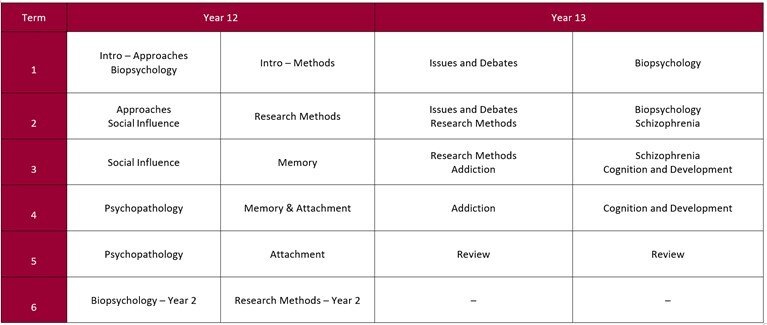- Home
- Curriculum and Exams
- Subjects
- Psychology
Psychology
BackHead of Department: Ms L Stockdale
Teachers: Above plus Mrs J Matthews
What is Psychology?
Psychology is the scientific study of mind and behaviour; psychologists focus on understanding and explaining all kinds of human behaviour. Studying Psychology allows students to consider the brain and its functions and how it operates to create memories and attachments. It also provides the opportunity to look at different approaches to understanding behaviour and think about how psychologists observe and conduct experiments to find out more about the way people act and interact. Students can consider a range of issues such as why most people conform, how our early experiences shape us as a person and why some people suffer depression or other mental illness.
Students will learn a number of skills including analytical thinking, problem solving, critical reasoning, planning and conducting scientific investigations. Students should be prepared for the significant scientific and mathematical content alongside the need to develop extended written skills.
Psychology is a fascinating social science with innovative research that has real-world applications that students are bound to find interesting. [Updated 2023/24]
People who have a sense of self-efficacy bounce back from failure; they approach things in terms of how to handle them rather than worrying about what can go wrong.
Albert Bandura
A Level: Years 12 and 13

- Social influence – Why do people conform?
- Memory – How are memories stored?
- Attachment – How do we form attachments in early childhood?
- Psychopathology – What counts as abnormality?
- Approaches in Psychology – What are the different psychological approaches?
- Biopsychology – What is the function of the nervous system?
- Research Methods – Which research methods do psychologists from different approaches use? How do ethics influence research?
- Issues & Debates in Psychology – What is the nature/nurture debate and what do psychologists think? How have gender bias and cultural bias affected Psychology?
- Students also study three option topics: Cognition and Development; Schizophrenia; Addiction.
Assessment /examination
Students sit three two-hour exam papers at the end of the course, each worth 33.3% of their grade:
- Paper 1: Introductory Topics in Psychology – Social Influence, Memory, Attachment, Psychopathology
- Paper 2: Psychology in Context – Approaches to Psychology, Biopsychology, Research Methods
- Paper 3: Issues & Options in Psychology – Issues & Debates, Cognition & Development, Schizophrenia, Addiction
Exam board: AQA
Careers Education
Psychology and related areas of study are an incredibly popular choice at university. It can provide students with a host of exciting career options including clinical psychology, marketing, occupational therapy, teaching, business development, forensic psychology, nursing and human resources.